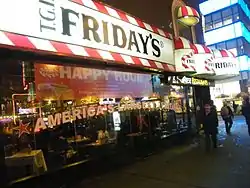The Michelangelo
The Taft Hotel is a 22-story pre-war Spanish Renaissance structure that occupies the entire eastern side of Seventh Avenue between 50th and 51st Street, just north of Times Square, in New York City. In its modern configuration, it features two separate and distinct uses, each with their own entrance on 51st St. The first and largest portion of building is devoted to the residential condominium called Executive Plaza, with each of its 440 units being privately owned. Certain units are rented by their owners to the public through the Oakwood brand.[1] Sharing a smaller portion of the building is The Michelangelo, a Starhotels hotel.
| The Taft Hotel Building | |
|---|---|
 The historic Taft Hotel building in 2009 | |

| |
| Hotel chain | Starhotels |
| General information | |
| Location | Manhattan, New York City |
| Address | 152 West 51st Street |
| Opening | 1926 |
| Management | Starhotels |
| Height | 226 ft |
| Technical details | |
| Floor count | 22 |
| Design and construction | |
| Architect | H. Craig Severance |
| Other information | |
| Number of rooms | 178 |
Manger Hotel
The building was designed by H. Craig Severance and opened in 1926 as the Manger Hotel, a major hotel chain of the period.[2] It was connected to the famous Roxy Theatre, a movie and stage show palace of the same time. The lobby of the Roxy was actually located in the 50th St and Seventh Avenue corner of the hotel building. On opening, the hotel offered 2,250 rooms and was the largest hotel in Times Square. The development cost more than $10 million (equivalent to more than $144 million in 2019), an enormous amount of money at the time. Madison Square Garden was a block to the west and drew thousands for major events.
Below is a list of the hotels in the Manger Hotel chain owned and operated by Julius and William Manger:
The Manger Hotels (New York City)
Wolcott Hotel, 4 West 31st Street
Hotel Imperial 81st to 82nd Street and Broadway
Great Northern Hotel 118 West 57th Street
Bell Apartment Hotel
Hotel Times Square, 255 W. 43rd Street
Hermitage Hotel, 42nd Street and 7th Avenue
Cumberland Hotel, Broadway and 54th Street
Endicott Hotel, 81st Street and Columbus Avenue
Navarre Hotel, 38th Street, and 7th Avenue
Grand Hotel, Broadway and 31st Street
York Hotel, 36th Street and 7th Avenue
Hotel Manger, 50-51 street, 7th avenue
St Regis Hotel East 55th Street, 5th Avenue
Gotham Hotel (Peninsula) 55th and Fifth Avenue
Netherlands Hotel (Sherry Netherlands Hotel)
Hotel Cumberland Broadway at 54th Street
Hotel Martha Washington 29 to 30 East 30th Street
Windsor Hotel West 58th Street
Hotel Aberdeen West 32nd Street
The Manger Hotels (Washington DC)
The Hay Adams Hotel 800 16TH ST NW, WASHINGTON, DC 20006
The Annapolis Hotel 11to to 12th on H Streets, NW Washington, D.C
The Hamilton Hotel 1001 14th St NW Washington, DC 20005 United States
The Manger Hotels (Boston)
The Manger Hotel Boston & Maine R. R. Terminal and Boston Madison Square Garden
The Manger Hotels (Philadelphia)
The Continental Hotel (834 Chestnut Street in Center City, Philadelphia, Pennsylvania)
The Manger Hotels (Chicago)
The Hotel Plaza (Chicago, Clark and North, Lincoln Park)
Taft Hotel
It was renamed for President William Howard Taft in 1931 after being sold.[3]
One of the hotel's most famous features was the Taft Grill.
The George Hall Orchestra (sometimes called the George Hall Taft Hotel Orchestra) performed from the hotel on Monday through Saturday at noon on CBS Radio, starring Dolly Dawn.[4] The band's signature song was "Love Letters in the Sand".
Other big band performances were by Artie Shaw, Xavier Cugat, Tommy and Jimmy Dorsey, Glenn Miller, and Tony Pastor.[5]
Vincent Lopez performed in residency for 20 years and broadcast a radio show from the hotel, with Gloria Parker, Shake the Maracas. Lopez later broadcast a TV show from the Taft on the DuMont Television Network, Dinner Date, from January to July 1950.
On May 26, 1933, Jimmie Rodgers (the Father of Country Music) died here at the age of 35 from a long battle with tuberculosis. This occurred just two days after completing what was his final recording session for Victor Records.
In 1955, Philip Loeb died from an overdose of sleeping pills at the hotel in the Hollywood blacklist scandal.
A scene from the 1967 film How to Succeed in Business Without Really Trying, in which Finch follows a rival executive to a football pep party, was shot at the hotel.
Grand Bay Hotel, Parc FiftyOne, The Michelangelo, Executive Plaza

The demolition of Madison Square Garden and the Roxy Theatre, and the increasing presence of unsavory businesses and the desire for newer more elegant hotels contributed to the early 1980s closing of the Taft Hotel. In 1988, following the construction of the 787 Seventh Avenue office tower, across 51st Street to the north, the hotel was converted to mixed use. The eighth through the 21st floors were rebuilt as condominiums and the first seven floors were occupied by the Grand Bay Hotel. The hotel and the condominiums had separate entrances side by side on 51st Street.[3]
In 1990, hotel chain Park Lane International acquired the hotel portion and renamed it Parc Fifty-One. In 1992, Starhotels acquired it for $42 million and renamed the hotel The Michelangelo.[3]
The residential condominium portion of the building, Executive Plaza, was listed in a 2015 New York Times article as having the highest proportion of non-primary residences of any building in Manhattan, at 74.4%. The building allows owners to rent out their apartments by the month, and most of the apartments are small – some under 400 square feet. One real estate broker suggested, "It isn’t surprising that it would have the highest ratio of investor apartments, because it operates more like a hotel than a condo."[6]
The building also includes America's largest T.G.I. Friday's,[7] located in the space that once housed the lobby of the Roxy Theatre, and a Ruth's Chris Steakhouse facing West 51st St.
References
- https://www.oakwood.com/furnished-apartments/NEW-YORK/Executive-Plaza
- Taft Hotel - Emporis.com - Retrieved December 31, 2008
- "POSTINGS: Remember the Taft?; A StarHotel on 51st Street". The New York Times, June 28, 1992. Accessed August 12, 2009.
- Martin, Douglas. "Dolly Dawn, 86, Who Sang Center Stage in the Big Band Era". The New York Times, December 18, 2002. Accessed August 12, 2009.
- The Michelangelo Hotel. hotelbook.com. Accessed August 12, 2009.
- https://www.nytimes.com/2015/01/11/realestate/new-york-citys-emptiest-co-ops-and-condos.html
- http://www.timessquarenewyears.com/parties-tgi-fridays-new-years.php